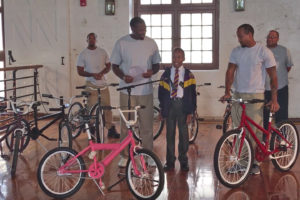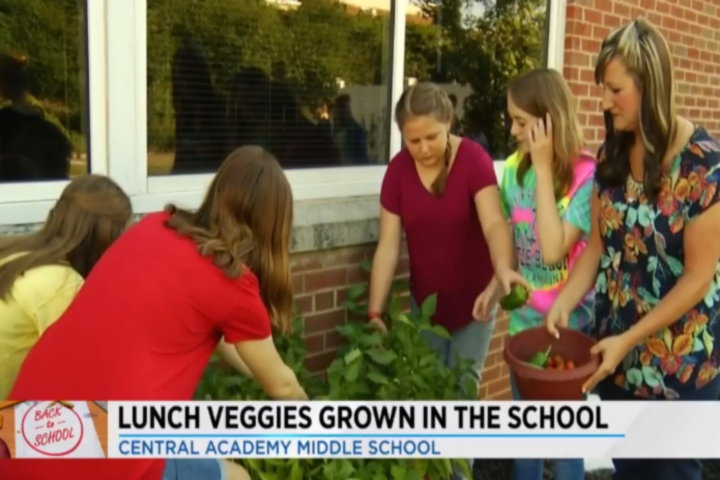Last year, the area behind Central Academy Middle School was a barren strip of grass, but this year students are picking tomatoes, cucumbers and other veggies to supply the school salad bar.


Last year, the area behind Central Academy Middle School in Fincastle, Virginia was a barren strip of grass, but this year students are picking tomatoes, cucumbers and other veggies on that land to supply the school salad bar. The project, which also includes a small fish pond, is a collaboration between students in Central Academy’s art and agriscience classes, who designed the layout, selected and planted the crops, and decorated the garden with painted rocks and other artwork.
“I’m learning plant science, taking care of animals, taking care of crops,” seventh-grader Dylan Matheny told WSLS. “It’s fun. I like working outside. It’s nice doing all this. It looks like it’s really gone together well. Plants are doing good.”
“It’s amazing,” classmate Kaela Riddle added. “Everybody’s working together also.”
Agriscience teacher Jennifer Hannah told the news site she partnered with the Mountain Castle Soil and Water Conservation District to secure a school improvement grant through the Chesapeake Bay Foundation to attract pollinators to the area with native plant species.
The goal, she said, is to help students learn the value of accomplishing a large multi-faceted project, while also providing sustainable gardening skills they can use at home.
“This has been a student-driven project from day one,” she said. “I hope they walk away with some skills where they can do some sustainable gardening for themselves but also with some great pride in the work that they’ve done. This is a huge project for them.”
The group, which shared its latest crop with WSLS, now wants to add a greenhouse at the school to continue the work year-round.
“Everyone said the veggies were delicious,” said WSLS anchor Jenna Zibton.
The sense of accomplishment students gain from the experience is an undoubtedly positive contribution to the “moral ecology” that profoundly shapes their character.
In “The Content of Their Character,” a summary of character education in a variety of schools published by the Institute of Advanced Studies in Culture, researchers note:
When social institutions – whether the family, peer relationships, youth organizations, the internet, religious congregations, entertainment, or popular culture – cluster together, they form a larger ecosystem of powerful cultural influence.
The University of California Berkeley’s Greater Good Magazine explores in more depth how all different kinds of cultural influences impact character, and how students, educators and others can make a difference.
Greater Good’s “science based insights for a meaningful life” includes articles on everything from “How Seeing Good in People Can Help Bridge Our Differences” to “How to Raise a Kid with a Conscience in the Digital Age.”
Other features on the site include a Happiness Calendar, Greater Good quiz, and articles about specific virtues like compassion, gratitude, mindfulness and others.